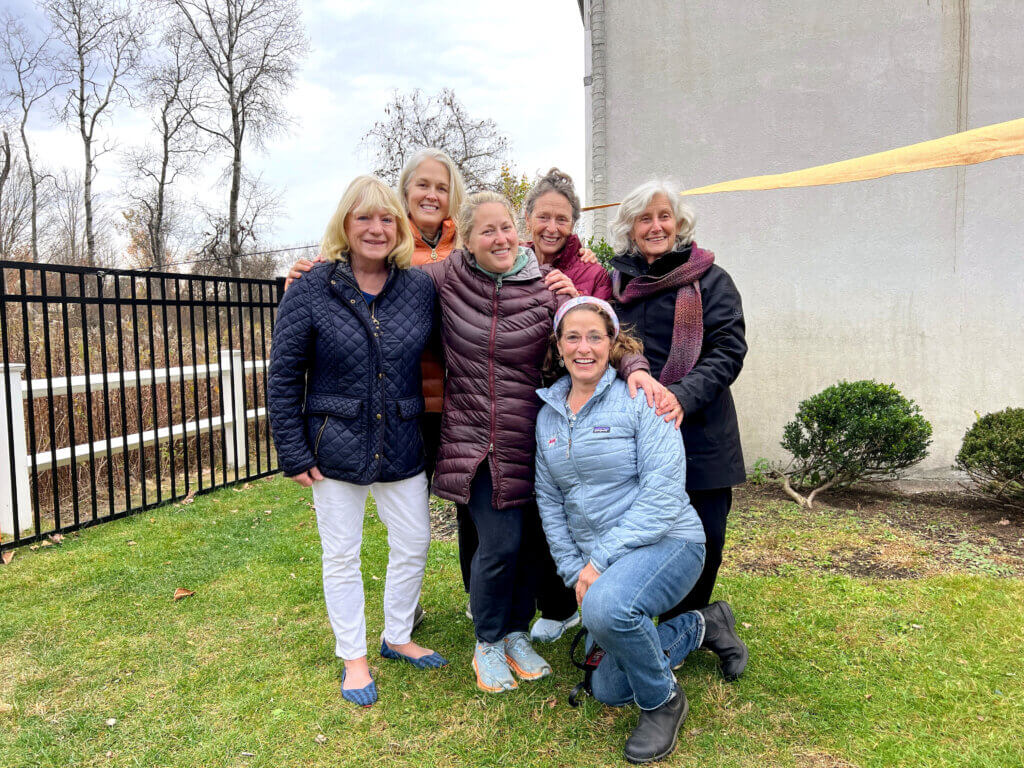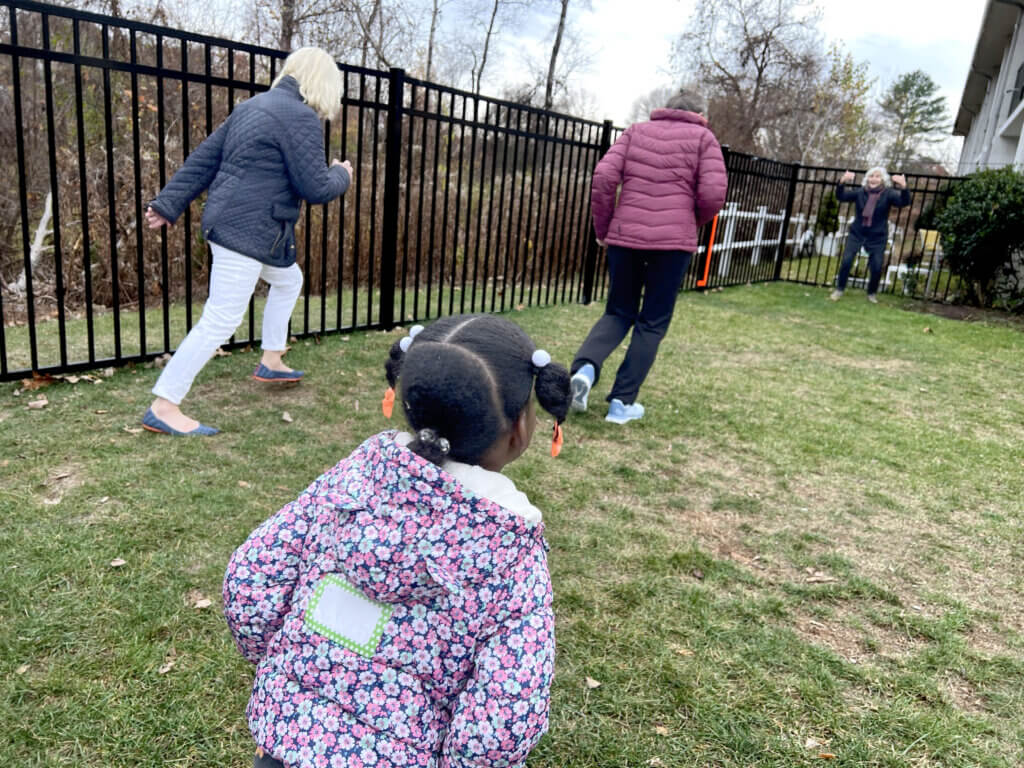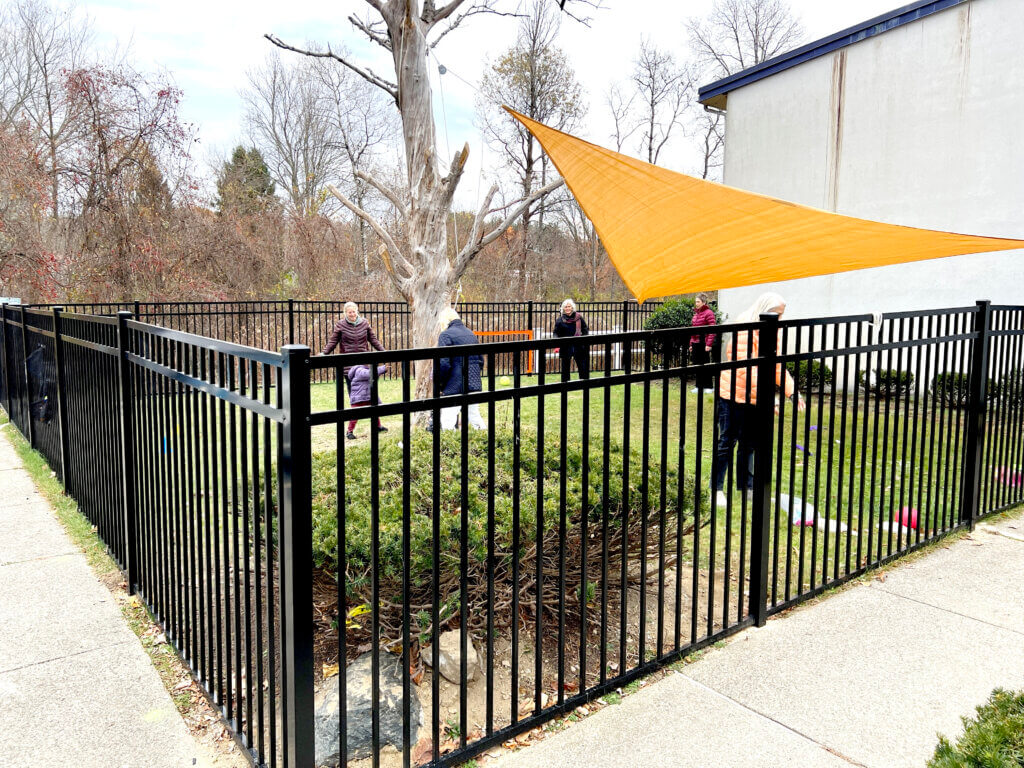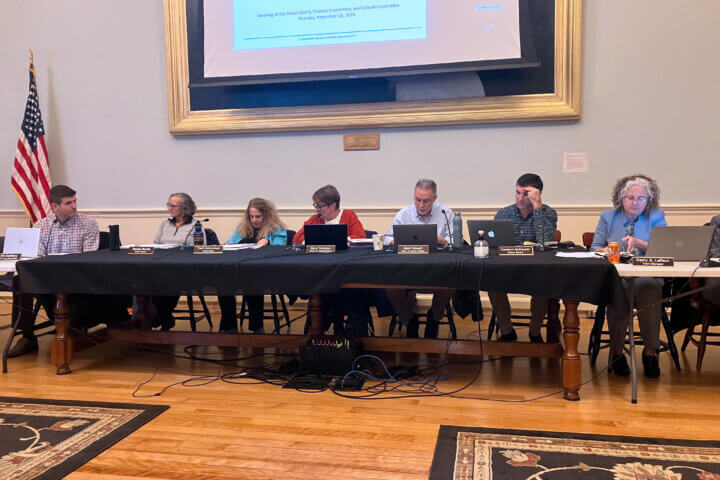By Dakota Antelman — Dakota@concordbridge.org
In a state emergency shelter intended to be a temporary stopping point for families in crisis, new outdoor play spaces aim to help children grow and thrive.
The play spaces at the Elm Street shelter opened just in time to be used before colder weather settles in this fall. For local volunteers who work with the children, they’re part of a larger effort to welcome people they say have been “dehumanized” in other settings.
“They’re going to become part of our community,” said Jeanne Fahey of the kids and families at the shelter. “Why not embrace them?”
The Concord Bridge first spoke with volunteers for a story about their work with shelter residents before the newspaper’s continued reporting uncovered issues at the state-regulated shelter including an ongoing cockroach infestation, septic backups, and damaged toilets.
Shortly after the newspaper started asking questions, the state said it would temporarily stop sending new families to the Elm Street shelter because of the infestation.
Volunteer reaction
After the stories ran in the November 22 issue of The Bridge, Concord shelter volunteers contacted the newspaper to express concern on two fronts.
They said the shelter’s successes and the warm reception residents received deserved greater acknowledgment. And they were apprehensive that shelter residents might be unfairly faulted or demonized for the conditions.
Fiona Stevenson, who volunteers at the shelter, said that many who give of their time are keenly attuned to hateful rhetoric about migrants circulating at the national level.
“We’re just afraid of that playing out in any kind of way that would impact the residents,” said Stevenson, who also writes a column on books for The Bridge, after the November 22 story ran.
Massachusetts has not been immune from controversy and even flare-ups of hostility as a housing crisis, intensified by waves of migrant arrivals, has put pressure on the state. Communities including Woburn and Marlborough have dealt with neo-Nazi demonstrations at shelters, according to news reports.
Stevenson said she has not interacted with anyone in Concord who has made racist comments about the shelter.
Concord police Capt. Brian Goldman said the department has not dealt with any hate or bias issues involving the shelter, “and, knock on wood, it won’t happen here.”
Goldman said there has been no significant increase in the number of calls for police services since the former Best Western converted to emergency housing.
“I think there was some trepidation back in the beginning and I think, as this thing has come along, there has been a lot of community support,” he said.

‘Genuine care’
Concord Carlisle Foundation executive director Jennifer Ubaldino has helped organize donation drives and other efforts to benefit the shelter. Having seen Concord’s willingness to step up in times of crisis, she said she was not surprised when people heeded the call to help shelter residents.
“I’m always kind of overwhelmed by the truly thoughtful selflessness that people have,” she said.
Rep. Simon Cataldo (D-Concord) also praised the community, saying, “No one could have reasonably expected the level of responsiveness and genuine care.”
Many are still cautious about the possibility of hostile incidents fueled by hostile attitudes toward immigrants. “We’re just trying to avoid national toxic feelings coming into the community that has welcomed and made this shelter possible,” Stevenson said.
The non-profit Making Opportunity Count (MOC) runs the Concord shelter under a state contract. Horizons for Homeless Children supplements MOC’s programming with trauma-informed play spaces for children.
Asked about the cockroach infestation on November 12, Horizons’ director of marketing and communications Deanna Dwyer said “Horizons’ focus is on the play space,” and deferred questions to MOC.
“I hope that it comes across that the success of the Concord Playspace has served as a model for how other communities can welcome and support shelter residents in a mutually beneficial way,” Dwyer said in an email.
A time of need
The state signed deals to open the shelter in spring 2023. Massachusetts’ shelter system was under pressure from a surge of people experiencing homelessness. Officials increasingly turned to hotels to lessen the load.
Some shelter residents came from New England and elsewhere in the U.S. Many came from countries including Haiti and Chile.
“I’m the daughter of immigrants,” volunteer Miriam Zarchan told The Bridge during a group interview in early November. “I’m very aware of what it means to receive support and welcome versus not.”
Zarchan started working with other volunteers at Horizons’ initial indoor play spaces and was involved in the effort to open outdoor spaces.
Alison Hassinger said she “wanted to be a helper in a time of need in our community.”
Volunteers come from different backgrounds, but they all support children whose families reserve times to enjoy Horizons’ play spaces. Several said they’ve seen children grow at the shelter. Volunteers said they also see a counterpoint to certain narratives about people who immigrated to the U.S.
“When I hear people talking and [all] the hateful things, there almost seems to be an element of dehumanizing,” Kim Kossmann said.
“When you’re playing with these children, they’re so obviously human. They’re just like any other child.”

Community support
The outdoor play space project benefited from community donations.
Outside the play space, volunteers said they’ve seen Concord embrace families in other ways.
While she acknowledged volunteers “don’t have a lot of contact with the parents,” Fahey said her 10-year-old daughter has become friends with a girl in her class who lives at the shelter.
“People are just accepting her as another kid,” Fahey said of her daughter’s friend. “Who cares where she lives, and where she’s from?”
Fahey and other volunteers praised the work of local school staff members in supporting students. She also said community members have arranged carpooling to get children from the Elm Street shelter to local soccer games.
Hassinger highlighted work by one of Concord’s elementary school parent teacher groups, which she said recently handed $20 in discreet envelopes to each student in need of financial support, including youngsters who live at the shelter, to help them participate in the school’s book fair.
The PTG also provides supplies and backpacks to children with financial needs, she said. Hassinger did not wish to identify the specific elementary school due to safety concerns.
“Everyone is kind of stepping up in their own ways,” Hassinger said.
Stevenson said the Concord Free Public Library has donated a large number of books to children at the shelter.
With all the support, Zarchan said society will benefit from shelter residents’ future contributions.
“I can tell stories of individual children,” she said. “I can see them being mayors. I can see them being engineers. I can see them being major artists. You see the seeds of real talent.”







